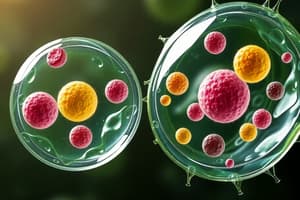Podcast
Questions and Answers
Which of the following statements accurately reflects a characteristic of eukaryotic cells compared to prokaryotic cells?
Which of the following statements accurately reflects a characteristic of eukaryotic cells compared to prokaryotic cells?
- Eukaryotic cells reproduce mainly through binary fission.
- Eukaryotic cells have a defined nucleus that contains their genetic material. (correct)
- Eukaryotic cells lack membrane-bound organelles.
- Eukaryotic cells have a nucleoid region instead of a nucleus.
During which phase of the cell cycle does DNA synthesis primarily occur?
During which phase of the cell cycle does DNA synthesis primarily occur?
- M phase
- G1 phase
- G2 phase
- S phase (correct)
Which organelle is primarily responsible for energy production in eukaryotic cells?
Which organelle is primarily responsible for energy production in eukaryotic cells?
- Lysosome
- Mitochondrion (correct)
- Ribosome
- Endoplasmic reticulum
What is a key function of desmosomes in epithelial tissue?
What is a key function of desmosomes in epithelial tissue?
Which of the following accurately describes a characteristic of cancerous cells?
Which of the following accurately describes a characteristic of cancerous cells?
Flashcards are hidden until you start studying
Study Notes
Cell Theory
- Fundamental principle stating that all living organisms are composed of cells.
- Establishes that the cell is the basic unit of life.
- Highlights that all cells arise from pre-existing cells.
Important Events in Cell Theory
- 1665: Robert Hooke first observes cells in cork.
- 1838: Matthias Schleiden proposes that all plants are made of cells.
- 1839: Theodor Schwann extends the theory to animals.
- 1855: Rudolf Virchow concludes that all cells come from existing cells.
Postulates of Cell Theory
- All living things are made of one or more cells.
- The cell is the basic unit of structure and function.
- All cells arise from existing cells.
Types of Organisms
- Unicellular organisms: Single-celled, e.g., bacteria, protozoa.
- Multicellular organisms: Made up of multiple cells, e.g., plants, animals.
Types of Cells: Similarities and Differences
- Prokaryotic cells: Lack a nucleus, typically smaller, simpler structure, e.g., bacteria.
- Eukaryotic cells: Contain a nucleus, larger and more complex, e.g., animals, plants, fungi.
- Both types share essential components: cell membrane, cytoplasm, and ribosomes.
Organelles in Prokaryotic and Eukaryotic Cells
- Prokaryotic cells: Ribosomes, plasma membrane, cell wall, cytoplasm, genetic material (nucleoid).
- Eukaryotic cells: Nucleus, mitochondria, endoplasmic reticulum, Golgi apparatus, lysosomes, chloroplasts (in plants).
Cell Modification and Specialization
- Apical: Surface cells exposed to an internal or external environment; often involved in absorption or secretion.
- Basal: Cells anchored to the basement membrane; involved in adhesion and communication with connective tissue.
- Lateral: Cells that interact with neighboring cells; important for cell signaling and maintaining tissue structure.
Structures and Their Uses
- Cilia: Hair-like projections that enable movement or transportation of materials across cell surfaces.
- Flagella: Tail-like structures that aid in cell movement.
- Pseudopodia: “False feet” used by some cells (like amoeba) for movement and feeding.
- Villi: Small, finger-like projections that increase surface area for absorption in the intestines.
- Microvilli: Even smaller projections that further enhance surface area for absorption.
- Desmosomes: Junctions that provide strong adhesion between cells.
- Gap junctions: Allow for direct communication between adjacent cells.
- Tight junctions: Seal gaps between cells to prevent leakage of substances.
Specialized Cells
- Root cells: Absorb water and nutrients from soil; specialized for water uptake.
- Guard cells: Control the opening and closing of stomata in leaves; regulate gas exchange.
Cell Cycle
- Two main types: Mitosis and meiosis.
- Interphase: The phase where the cell prepares for division; consists of G1, S, and G2 phases.
Phases of Interphase
- G1 Phase: Cell growth and normal functions occur; cell prepares for DNA synthesis.
- S Phase: DNA replication takes place, leading to two complete sets of chromosomes.
- G2 Phase: Further growth and preparation for mitosis; checks for DNA errors.
Metaphase and G0 Phase
- Metaphase: Chromosomes align at the cell equator; spindle fibers attach.
- G0 Phase: A resting stage where cells exit the cell cycle and do not actively divide.
Cell Checkpoints
- Critical control points that ensure proper cell division; detect errors and prevent the progression of the cycle if issues are found.
Cancer Overview
- Cancer can be benign (non-cancerous, localized) or malignant (invasive, capable of spreading).
- Oncogenes are mutated genes that promote cell division and can lead to cancer.
- Proto-oncogenes are normal genes that may become oncogenes due to mutations.
- Tumor suppressor genes regulate cell division; mutations can lead to unregulated growth and cancer.
Studying That Suits You
Use AI to generate personalized quizzes and flashcards to suit your learning preferences.




